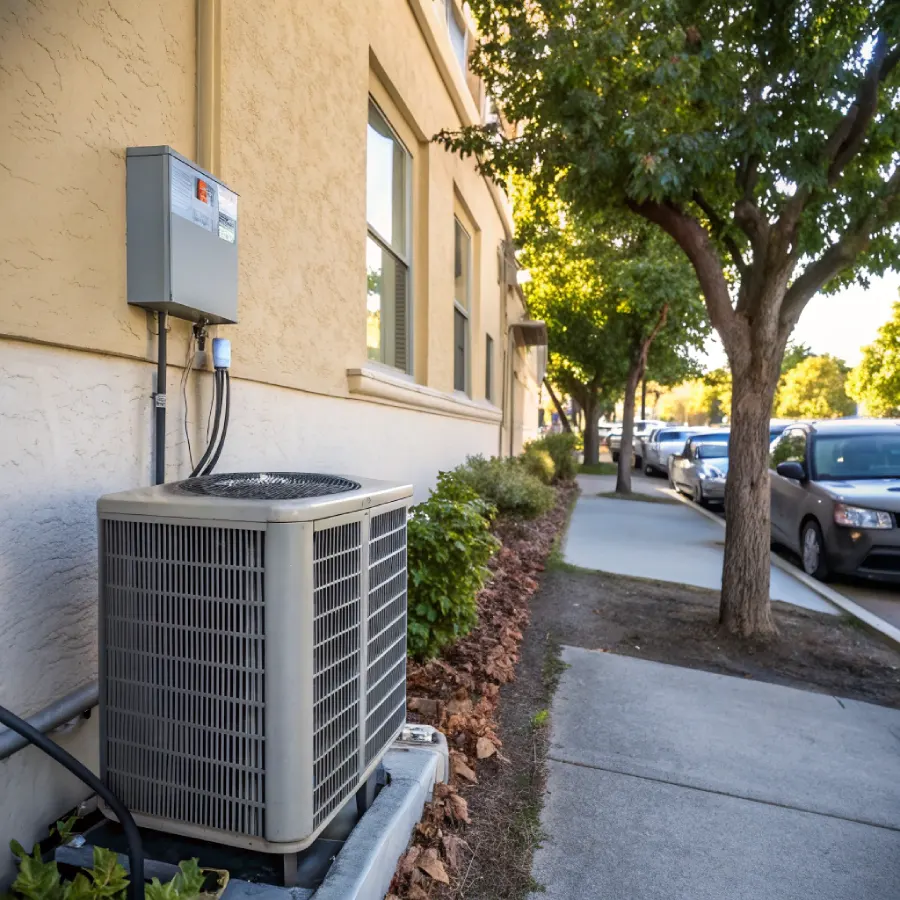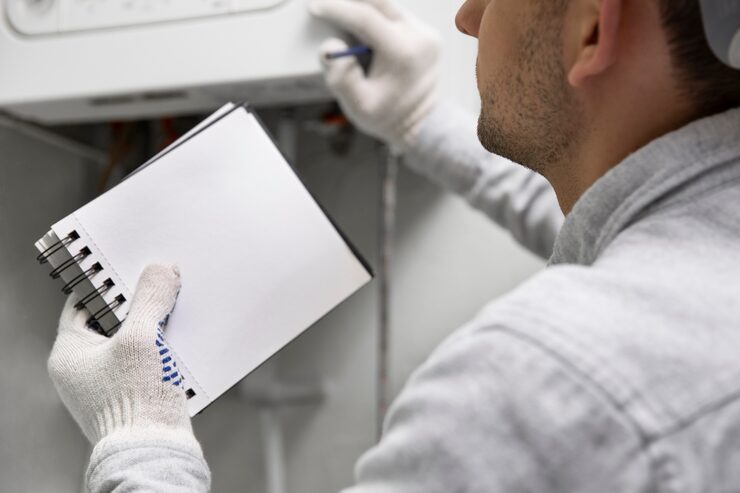Ever had your AC conk out in the middle of a sticky Ontario summer? It’s the worst, right? You’re left sweating, wondering how long do AC units last in Ontario anyway. With scorching summers and freezing winters, your air conditioner works hard, and its lifespan depends on a mix of factors like upkeep and local weather. In this guide, we’ll break down how long AC units typically last, what shortens their life, and how you can stretch their performance to keep your home comfy. Stick around to find out how to avoid those pricey breakdowns and keep your cool!
What’s the Typical Lifespan of AC Units in Ontario?
In Ontario, most AC units last 10 to 15 years, but that depends on the type of unit, how well you maintain it, and the environment it’s in. Energy Star says well-cared-for central air conditioners can hit 15 years, while neglected ones might die out by year 8. Ductless mini-splits, popular in condos, can go 12–17 years, and portable or window units usually manage 8–12 years. Ontario’s wild weather—hot, muggy summers and icy winters—plays a big role in how long your AC hangs on.
How Ontario’s Weather Affects Your AC
Ontario’s climate is no joke. Summers in places like Toronto or Hamilton often climb past 30°C with humidity that makes you feel like you’re in a jungle. Your AC has to work overtime to cool and dehumidify, which wears it out faster. Then there’s winter, with sub-zero temps that can mess with outdoor units if you don’t protect them. This hot-cold cycle puts extra stress on your system.
Types of AC Units and Their Lifespans
Not all ACs are created equal. Here’s a quick rundown:
- Central Air Conditioners: These big systems, common in houses, last 10–15 years with regular care. They use ductwork and a beefy compressor that needs TLC.
- Ductless Mini-Splits: Perfect for apartments or newer homes, these can go 12–17 years thanks to their efficient, duct-free design.
- Portable/Window Units: Smaller and cheaper, these last 8–12 years but take a beating from being exposed to the elements.
Image Alt Text: Central air conditioner in an Ontario backyard, showing typical setup for cooling homes.
Why Lifespan Varies Across Ontario
Your AC’s lifespan might differ depending on where you are in Ontario. Southern spots like Windsor or Niagara have longer, hotter summers, so units get more of a workout than in cooler Northern Ontario cities like Sudbury. Urban areas like Toronto also deal with more dust and pollution, which can clog up units faster. Knowing your local conditions helps you plan better maintenance.
Struggling with Your AC in Ontario’s Heat? Act Now!
Don’t let a failing AC ruin your summer comfort. For expert AC maintenance in Ontario , reach out today to extend your unit’s life and stay cool.
📞 Call Now: +1 (647) 967 4911What Shortens an AC Unit’s Life in Ontario?
A bunch of things can knock years off your AC’s lifespan. Let’s dive into the main culprits and how they impact durability of air conditioners.
1. Skimping on Maintenance
Skipping maintenance is like never changing your car’s oil—it’s a recipe for trouble. The Ontario Home Builders’ Association says poor upkeep can cut your AC’s life by up to 30%. Dirty filters, clogged coils, or low refrigerant make the system work harder, wearing out parts like the compressor or fan.
2. Overusing Your Unit
Running your AC 24/7 during Ontario’s humid summers puts serious strain on it. The compressor, the heart of the system, takes the biggest hit. Using it smartly, like setting the thermostat to 24–26°C, can make a big difference.
3. Shoddy Installation
If your AC was installed wrong—say, it’s too big or too small for your space—it’ll wear out faster. An oversized unit short-cycles, turning on and off too often, while an undersized one runs constantly. A pro HVAC tech can ensure it’s set up right.
4. Ontario’s Harsh Environment
Dust, pollen, and humidity in Ontario can clog or corrode your unit. Units sitting in direct sun or buried in snow during winter wear out quicker. Coastal areas near Lake Ontario might even see rust from humid, salty air.
5. Low-Quality Units
Not all ACs are built to last. Budget brands might save you money upfront but often crap out sooner. Higher-end brands like Lennox, Carrier, or Trane use better parts, adding a couple of years to your unit’s life.
6. Old Technology
Older ACs with low SEER (Seasonal Energy Efficiency Ratio) ratings—say, below 13—work harder and wear out faster. Newer, high-SEER models (16 or above) are designed to run smoother and last longer.
External Link: Natural Resources Canada’s AC efficiency tips can help you pick a better unit.
How to Make Your AC Last Longer in Ontario
Want to squeeze every year out of your AC? Here are practical, no-nonsense tips to boost your AC unit’s lifespan in Ontario’s tough climate.
1. Keep Up with Regular Maintenance
Getting a pro to tune up your AC every spring is a game-changer. They’ll check the compressor, clean coils, and make sure refrigerant levels are good. Natural Resources Canada says this can boost efficiency by 15%, which means less wear and tear.
- Swap or clean filters every 1–3 months to keep airflow smooth.
- Clear debris like leaves or snow from the outdoor unit.
- Check refrigerant to avoid stressing the compressor.
2. Get a Smart Thermostat
A programmable or smart thermostat, like Nest or Ecobee, lets you control your AC better. Set it to 24–26°C when you’re home and higher when you’re out to ease the load. It’ll adapt to Ontario’s weather swings, saving energy and wear.
3. Shield Your Unit from the Elements
Ontario winters are brutal on outdoor units. Use a breathable cover in the off-season to keep snow and ice out, but make sure it doesn’t trap moisture. Regularly clear away leaves, dirt, or branches to keep airflow strong.
4. Fix Problems Fast
Hearing weird noises like grinding or noticing weaker cooling? Don’t wait. Small issues can turn into big ones, like a fried compressor that costs $1,500–$2,500 to fix. Call a pro ASAP to catch problems early.
5. Boost Your Home’s Insulation
Good insulation and sealed windows cut down how hard your AC has to work. The Ontario Ministry of Energy says well-insulated homes can use 20% less AC energy, which means less strain and a longer life.
6. Consider an Upgrade
If your AC is pushing 10–12 years, think about upgrading to a high-SEER model. Newer units are tougher and more efficient, and you might score rebates through programs like the Home Efficiency Rebate Plus.
Image Alt Text: HVAC tech cleaning an AC unit in Ontario, showing key maintenance for longevity.
Why Bother Extending Your AC’s Life?
Taking care of your AC isn’t just about avoiding breakdowns—it comes with some solid perks.
Save Money
A well-maintained AC runs more efficiently, cutting your energy bills by up to 20%, per Energy Star. Plus, delaying a $3,000–$7,000 replacement by a few years is a big win. Annual maintenance costs just $100–$200, so it’s a no-brainer.
Stay Comfy
A healthy AC keeps your home at a steady, cool temperature, even when Ontario’s humidity is off the charts. No more sweating through summer or dealing with sudden breakdowns.
Help the Planet
Longer-lasting ACs mean less waste and fewer new units being made. Efficient systems also use less energy, cutting your carbon footprint in line with Ontario’s green goals.
Boost Home Value
A reliable, efficient AC can make your home more appealing to buyers. In Ontario’s hot real estate market, energy-efficient upgrades are a big selling point.
Table: Benefits of Extending AC Unit Lifespan
| Benefit | Description |
|---|---|
| Save Money | Cuts energy bills by up to 20% and delays $3,000–$7,000 replacements. |
| Stay Comfy | Keeps your home cool and consistent, even in humid summers. |
| Help the Planet | Reduces waste and emissions with longer-lasting, efficient units. |
| Boost Home Value | Makes your home more attractive with modern, efficient systems. |
What Happens If You Ignore Maintenance?
Skipping AC care is asking for trouble. You could lose 5–10% efficiency each year, jacking up your bills. A busted compressor can cost $1,500–$2,500 to fix, and a full replacement runs $3,000–$7,000. Dirty filters also mess with air quality, trapping dust and allergens. For $100–$200 a year, maintenance is a steal compared to those costs.
External Link: Energy Star’s AC maintenance guide has a handy checklist.
When Should You Replace Your AC?
Sometimes, replacing is smarter than repairing. Think about swapping your unit if:
- It’s over 12–15 years old.
- Repairs cost more than 50% of a new unit.
- Your energy bills are climbing despite maintenance.
- It uses old refrigerants like R-22, banned in Canada since 2020.
A new, high-SEER unit (16+) can save 20–40% on energy and might qualify for rebates. Talk to an HVAC pro to weigh your options.
Wrapping It Up
Figuring out how long AC units last in Ontario can save you from sweaty summers and hefty repair bills. Most units last 10–15 years, but maintenance, smart usage, and protecting your system from Ontario’s wild weather can push that closer to 15 or more. Regular tune-ups, a smart thermostat, and quick fixes for issues are your best bets for a long-lasting, efficient AC. Don’t let your unit die early—take action now to keep it running strong. Book a pro check-up or look into energy-efficient upgrades to beat the heat!
FAQs About AC Unit Lifespan in Ontario
Got questions about air conditioning maintenance tips or durability of air conditioners? We’ve got answers.
How Do I Know If My AC Is on Its Last Legs?
Look for signs like constant repairs, weak cooling, weird noises (like rattling or hissing), or spiking energy bills. If your unit’s over 10 years old and repairs cost more than half a new unit, it’s time to think about replacing it.
What’s the Best Maintenance Schedule for Ontario?
Get a pro tune-up every spring to prep for summer. Check filters monthly during heavy use and clean the outdoor unit before and after winter to clear debris.
Are There Rebates for New AC Units in Ontario?
Yup! Programs like the Home Efficiency Rebate Plus can offer up to $5,000 for energy-efficient upgrades. Check Ontario.ca for details.
How Does Ontario’s Climate Hit AC Lifespan?
Humidity and heat make your AC work harder, while winter frost can damage outdoor parts. Regular cleaning and covering your unit in winter help fight these effects.
Can I Maintain My AC Without a Pro?
You can handle simple stuff like cleaning filters or clearing debris, but pros are needed for things like checking refrigerant or electrical parts. A mix of DIY and pro care works best.
Which AC Brands Last Longest?
Brands like Lennox, Carrier, and Trane are built tough, often hitting 15+ years with good care. Always check warranties and reviews before buying.
Image Alt Text: Worn-out AC unit in Ontario, showing why maintenance matters for longevity.






 by Canada Create Agency. All Roghts Reserved By SANO HEATING LTD.
by Canada Create Agency. All Roghts Reserved By SANO HEATING LTD.